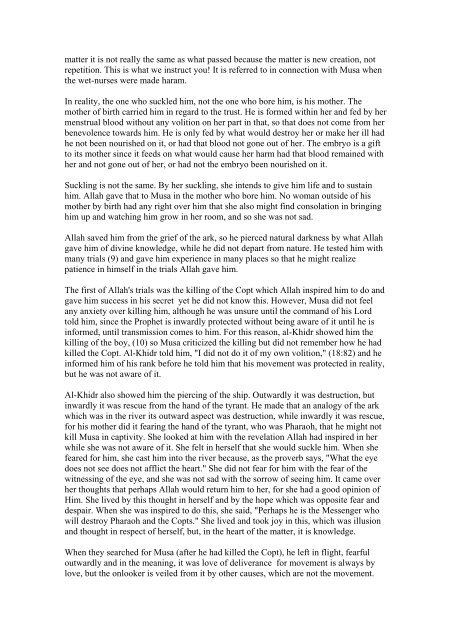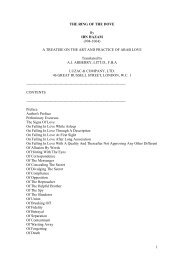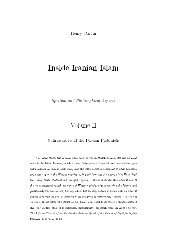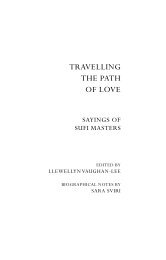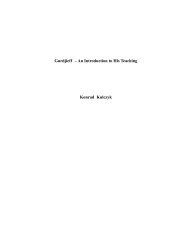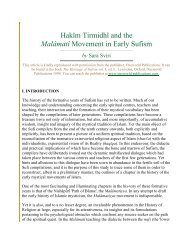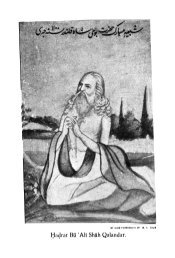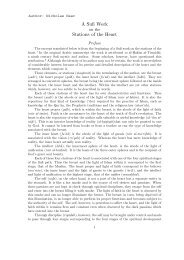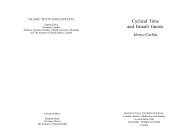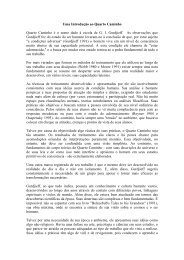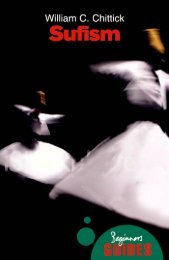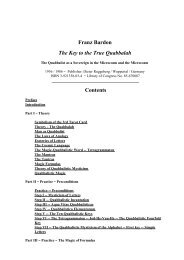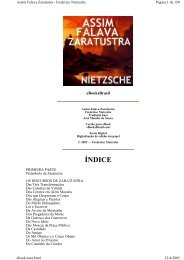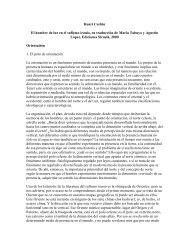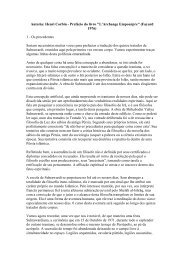Fusus al-Hikam The Seals of Wisdom by Shaykh al ... - ImagoMundi
Fusus al-Hikam The Seals of Wisdom by Shaykh al ... - ImagoMundi
Fusus al-Hikam The Seals of Wisdom by Shaykh al ... - ImagoMundi
Create successful ePaper yourself
Turn your PDF publications into a flip-book with our unique Google optimized e-Paper software.
matter it is not re<strong>al</strong>ly the same as what passed because the matter is new creation, not<br />
repetition. This is what we instruct you! It is referred to in connection with Musa when<br />
the wet-nurses were made haram.<br />
In re<strong>al</strong>ity, the one who suckled him, not the one who bore him, is his mother. <strong>The</strong><br />
mother <strong>of</strong> birth carried him in regard to the trust. He is formed within her and fed <strong>by</strong> her<br />
menstru<strong>al</strong> blood without any volition on her part in that, so that does not come from her<br />
benevolence towards him. He is only fed <strong>by</strong> what would destroy her or make her ill had<br />
he not been nourished on it, or had that blood not gone out <strong>of</strong> her. <strong>The</strong> embryo is a gift<br />
to its mother since it feeds on what would cause her harm had that blood remained with<br />
her and not gone out <strong>of</strong> her, or had not the embryo been nourished on it.<br />
Suckling is not the same. By her suckling, she intends to give him life and to sustain<br />
him. Allah gave that to Musa in the mother who bore him. No woman outside <strong>of</strong> his<br />
mother <strong>by</strong> birth had any right over him that she <strong>al</strong>so might find consolation in bringing<br />
him up and watching him grow in her room, and so she was not sad.<br />
Allah saved him from the grief <strong>of</strong> the ark, so he pierced natur<strong>al</strong> darkness <strong>by</strong> what Allah<br />
gave him <strong>of</strong> divine knowledge, while he did not depart from nature. He tested him with<br />
many tri<strong>al</strong>s (9) and gave him experience in many places so that he might re<strong>al</strong>ize<br />
patience in himself in the tri<strong>al</strong>s Allah gave him.<br />
<strong>The</strong> first <strong>of</strong> Allah's tri<strong>al</strong>s was the killing <strong>of</strong> the Copt which Allah inspired him to do and<br />
gave him success in his secret yet he did not know this. However, Musa did not feel<br />
any anxiety over killing him, <strong>al</strong>though he was unsure until the command <strong>of</strong> his Lord<br />
told him, since the Prophet is inwardly protected without being aware <strong>of</strong> it until he is<br />
informed, until transmission comes to him. For this reason, <strong>al</strong>-Khidr showed him the<br />
killing <strong>of</strong> the boy, (10) so Musa criticized the killing but did not remember how he had<br />
killed the Copt. Al-Khidr told him, "I did not do it <strong>of</strong> my own volition," (18:82) and he<br />
informed him <strong>of</strong> his rank before he told him that his movement was protected in re<strong>al</strong>ity,<br />
but he was not aware <strong>of</strong> it.<br />
Al-Khidr <strong>al</strong>so showed him the piercing <strong>of</strong> the ship. Outwardly it was destruction, but<br />
inwardly it was rescue from the hand <strong>of</strong> the tyrant. He made that an an<strong>al</strong>ogy <strong>of</strong> the ark<br />
which was in the river its outward aspect was destruction, while inwardly it was rescue,<br />
for his mother did it fearing the hand <strong>of</strong> the tyrant, who was Pharaoh, that he might not<br />
kill Musa in captivity. She looked at him with the revelation Allah had inspired in her<br />
while she was not aware <strong>of</strong> it. She felt in herself that she would suckle him. When she<br />
feared for him, she cast him into the river because, as the proverb says, "What the eye<br />
does not see does not afflict the heart." She did not fear for him with the fear <strong>of</strong> the<br />
witnessing <strong>of</strong> the eye, and she was not sad with the sorrow <strong>of</strong> seeing him. It came over<br />
her thoughts that perhaps Allah would return him to her, for she had a good opinion <strong>of</strong><br />
Him. She lived <strong>by</strong> this thought in herself and <strong>by</strong> the hope which was opposite fear and<br />
despair. When she was inspired to do this, she said, "Perhaps he is the Messenger who<br />
will destroy Pharaoh and the Copts." She lived and took joy in this, which was illusion<br />
and thought in respect <strong>of</strong> herself, but, in the heart <strong>of</strong> the matter, it is knowledge.<br />
When they searched for Musa (after he had killed the Copt), he left in flight, fearful<br />
outwardly and in the meaning, it was love <strong>of</strong> deliverance for movement is <strong>al</strong>ways <strong>by</strong><br />
love, but the onlooker is veiled from it <strong>by</strong> other causes, which are not the movement.


